2205 duplex stainless
steel is mainly composed of 22% Cr, 3% molybdenum and 5-6% Ni nitrogen
composition. It has high strength, better impact toughness and better overall
and local resistance to stress corrosion.
General
properties of stainless steel
Compared with 316L
and 317L austenitic stainless steel, 2205 duplex stainless steel in the
anti-pitting corrosion and corrosion of the better performance, it has a high
corrosion resistance, compared with the austenite, its thermal expansion
coefficient is lower , Higher thermal conductivity.
2205 yield strength
is twice the austenitic stainless steel, this feature allows designers to
reduce the weight of the design of the product, so that this stainless steel
than 316, 317L stainless steel more price advantage.
This stainless steel
is particularly suitable for use in the temperature range of -50 ° F / + 600 ° F. Out of range applications should be used with caution,
especially when applied to welded structures.
The
applications of stainless steel
Pressure vessels,
high pressure storage tanks, high pressure pipes, heat exchangers (chemical
processing industry).
Oil and gas pipeline,
heat exchanger pipe fittings.
Sewage treatment
system.
Pulp and paper
industry classifiers, bleach equipment, storage processing systems.
High-strength
corrosion-resistant environment of the rotary shaft, press roll, blades,
impeller and so on.
Food processing
equipment.
Corrosion
resistance of stainless steel
Uniform
corrosion
Due to the Cr content
(22%), molybdenum (3%) and nitrogen content (0.18%), the corrosion resistance
of 2205 duplex stainless steel is better than 317L and 316L stainless steel in
most environments.
Partial
corrosion resistance
2205 in the Cr,
molybdenum and nitrogen content in the oxidizing and acidic solution, the point
of corrosion and corrosion has a strong resistance.
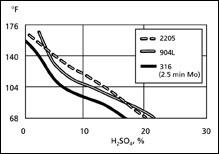
The corrosion curve
in a sulfuric acid solution containing 2000 ppm of chloride was 4 mpy (0.1 mm /
yr)
Anti-stress
corrosion
The dual phase
microstructure of stainless steel improves the corrosion resistance of
stainless steel. At a particular temperature, oxygen, tension and chloride in
the presence of austenitic stainless steel will occur chloride stress
corrosion.
Corrosion
resistance
2205 duplex stainless
steel has a very good anti-corrosion fatigue strength, especially suitable for
processing equipment, effectively avoid susceptible to corrosion environment
and loading cycle.
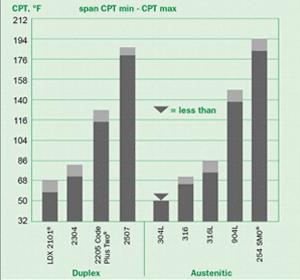
The critical
temperature of the etching in 1M NaCl was measured using an AvestaPolarit etch
cell
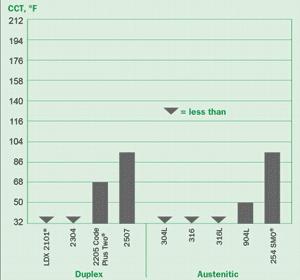
The critical
temperature of corrosion in the gap of 10% FeCl3.6H2O
Uniform
corrosion in wet treated phosphoric acid
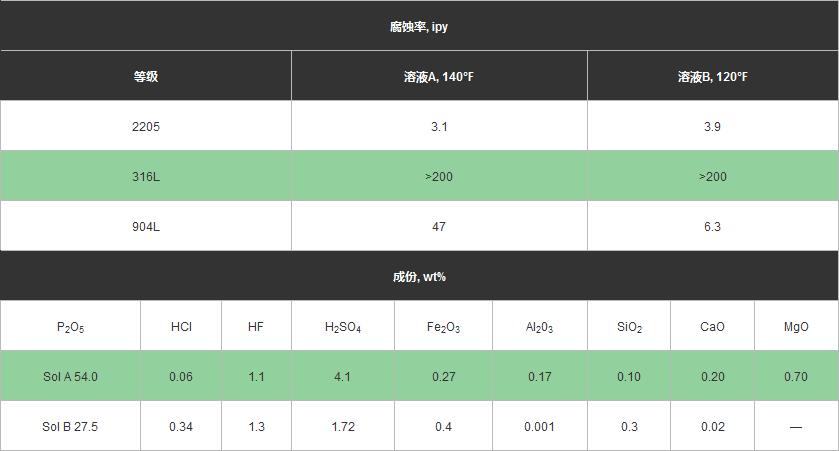
Uniform corrosion of
stainless steel
Resistance
to stress cracking
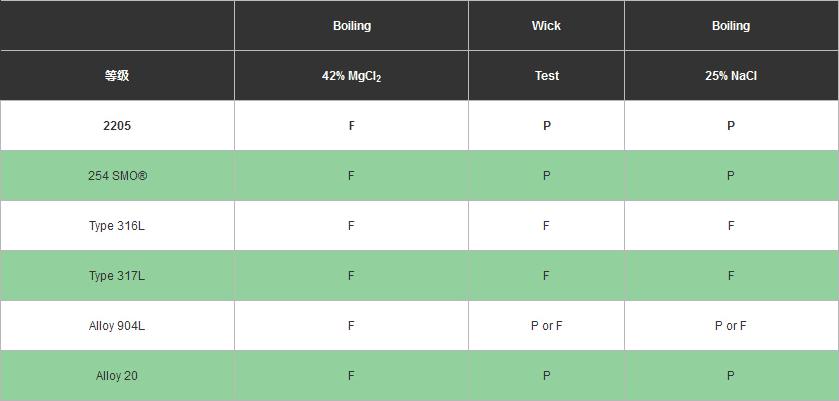
(P = via F = not
passed)
The
chemical composition of stainless steel

Average (% by weight)
Mechanical
properties of stainless steel
Mechanical properties
at room temperature

Mechanical properties
of stainless steel at room temperature
Mechanical
properties at high temperature

Mechanical properties
of stainless steel at high temperature
Physical
properties of stainless steel
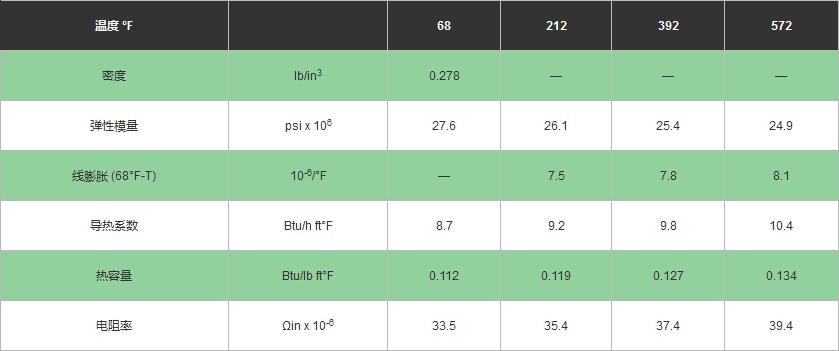
Physical properties
of stainless steel
structure
The chemical
composition of 2205 achieves the ideal microstructure 50 α / 50 γ after annealing at 1900 ° / 1922 ° F (1040 ° / 1080 ° C).
If the temperature of
the heat treatment is higher than 2000 ° F, the composition of the ferrite
component may be increased.
Like other duplex
stainless steel, 2205 duplex stainless steel is susceptible to intermetallic
precipitation. The intermetallic phase precipitates between 1300 ° F and 1800 ° F, and the precipitation rate is the fastest at 1600 ° F.
The
processing of stainless steel
Thermoforming
We recommend that the
forming should be carried out at temperatures below 600 ° F. During the
thermoforming process, the entire workpiece should be heated as a whole and
should be in the temperature range of 1750 ° F to 2250 ° F. 2205 Duplex stainless steel is very soft at this temperature. If
the temperature is too high, 2205 duplex stainless steel is easy to tear. If
below this temperature, austenite will break. Below 1700 ° F, the intermetallic phase is quickly formed due to temperature and
deformation. After the thermoforming is carried out, it should be immediately
annealed at a minimum temperature of 1900 ° F and
quenched to restore its phase balance, toughness and corrosion resistance. We
do not recommend stress relief, but if this is necessary, the material should
be annealed at a minimum temperature of 1900 ° F and
then rapidly cooled for water quenching.
Cold
forming
2205 duplex stainless
steel can be cut and cold formed. However, due to its own high strength and
hardness of 2205 duplex stainless steel, it is more cold than the austenitic
steel, but also because of its high strength, to fully take into account the
rebound factor.
The
heat treatment of stainless steel
2205 Duplex stainless
steel should be annealed at a minimum temperature of 1900 ° F and then rapidly
cooled for water quenching. This treatment is applied to solid solution
annealing and stress relief. Stress relief is carried out at temperatures below
1900 ° F, which can easily lead to the precipitation of
harmful metal or nonmetallic phases.
Mechanical
machinability
In the high-speed
machine, 2205 duplex stainless steel feed rate and cutting speed and 316L is
the same. If the use of carbonized knife, cutting speed and 316L compared to
about 20% lower, the performance of machinery and equipment and its components
play a key role in this.
Source: wilsonpipeline Pipe Industry Co., Limited (www.wilsonpipeline.com)






0 comments:
Post a Comment